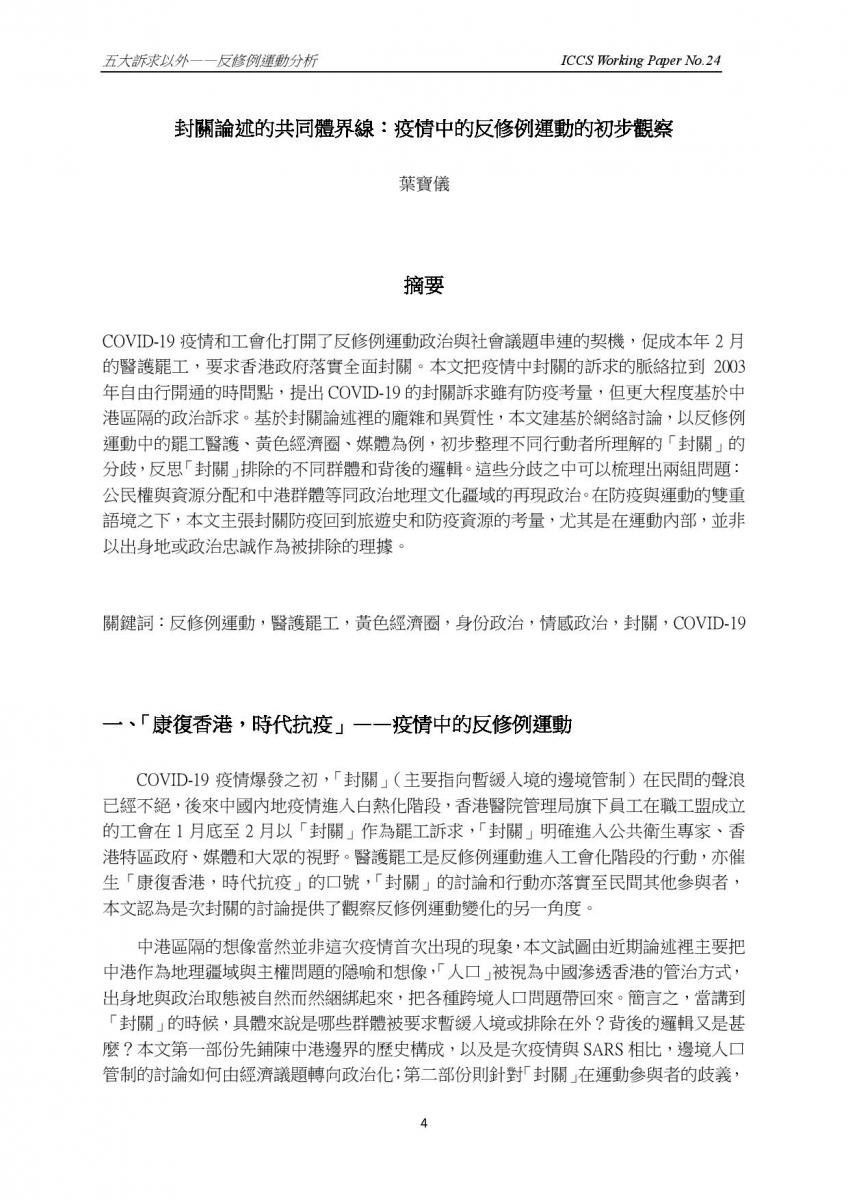

ICCS WPS 24 Beyond “the Five Demands”: An analysis of Anti-Extradition Law Amendment Bill Movement
Author/Speaker|葉寶儀、鄒文君、郭佳、劉璧嘉、黃雋浩
Publication Date|2020-06
Keywords|Anti-Extradition Law Amendment Bill Movement, yellow economic circle, “if we burn, you burn with us”, border shutdown, mainland students, pacifist-militant-alliance
Abstract
The Anti-Extradition Law Amendment Bill Movement (Anti-ELAB Movement) in Hong Kong has made 2019 uneasy for us. Our eyes weep in the tear gas, and our hearts burn with the city. Not only because we have a long and deep personal connection with Hong Kong, but also because the movement is never a perfect one. There are notions in the movement that we find difficult to totally agree with, but our affection towards the city and the movement has made it hard for us to leave the people on the streets. Our attachment towards the movement therefore has become a difficult one.
In face of depression, anxiety, worries and anger triggered by the movement, we are taking this research project as an opportunity to intervene and interact with the movement by producing knowledge for the movement. The research project demonstrates our will to evaluate the movement, to “be with the people” on the street, and more importantly, to settle our emotions.
The five Chinese essays included in the project will be using methodologies such as close-reading, thick-description, discourse analysis, historical analysis and ethnography to analyze and delineate different motifs in the movement. These motifs include: yellow economic circle, “if we burn, you burn with us”, border shutdown, mainland students, pacifist-militant-alliance, etc. Our problematic is to understand how people in the anti-ELAB movement organize, in what bases do they come together, in what momentum do they all share, so to explain why the movement is so big, and at last to predict the possibilities of how it is going to develop, change or self-disrupt.
By discussing different key concepts in the movement, not only do we want to problematize different notions in the movement, but also to problematize our own affective response. This knowledge production project therefore has become an experiment to see if it is possible “to stand with Hong Kong”, to be fragile, to feel their/our pain, but also to develop a kind of politics and knowledge that is more concrete, inclusive and open at the same time. If we can make our way out, maybe it can become an example for other people to tackle and respond to the right-wing-inclination in the movement. We also hope such kind of knowledge production does not only fall into the canon of “Hong Kong Studies”, and is not only about the “Anti-ELAB Movement” alone, but will serve as a reference for other “small places” like Hong Kong to grope our way through international politics. There may be more ways other than pleasing strong powers, but to empower ourselves and walk our own path. Solidarity to places like Jeju Island, Taiwan and Okinawa.
